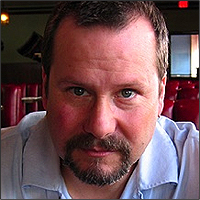Faith No More
// Bill Gould, bassistFAITH NO MORE are an alternative-rock band from San Francisco, California. “We Care A Lot” (1985) was released on Mordam Records, “Introduce Yourself” (1987), “The Real Thing” (1989), “Angel Dust” (1992), “King For A Day… Fool For A Lifetime” (1995), “Album Of The Year” (1997), and “Who Cares A Lot?” (1998) are all available from Slash Records. “Sol Invictus” (2015) is available from Reclamation Recordings.
Website: www.fnm.com
Photo: Bill Gould / Kool Arrow Records
Interview:
Both music and spirituality can have broad and varying subjective definitions, depending on the individual. On top of that, in my opinion, publicly verbalizing things of this nature feels more akin to reporting the condition of one’s latest bowel movement at the breakfast table, a little too intimate to share with friends, if you know what I mean. And then again, who am I to say whether something is spiritually significant, or even that I would know what it was if it hit me in the face?
It’s been stated to the point of cliché that music can have a spiritual effect on people, in addition to auditory, visual, and physical effects, and I can’t argue with that; songs, works, and harmonic frequencies touch people – they touch me – and that’s why we listen to them. And sometimes on a deep level, the fine people in Turkey who cut themselves with razors while listening to Muslim Gürses must be getting more than physical stimulation, because razors hurt! The same goes for a kid in the pit of a Slayer show.
But what is the significance? Do war marches have a spiritual significance? How about nationalistic anthems? Laxative commercials 69 on TV? If I’m watching Kylie Minogue lip-sync in front of 10,000 enraptured fans, does this qualify as a “spiritual” experience? The guy who has the theme of “Team America” looping in his head while he witnesses the birth of his first child? Or even the harmonic drones of the next door neighbor’s lawn mower? Does any of it even matter? “Spiritual” is not a word I use often or casually but when I do, I’m usually referring to heavy realizations, and life-changing events. One of the things about music that matters to me, in addition to its obvious capacity to stimulate, is in its ability to form lasting impressions. In this context, Music can serve as a marker. The stronger the impact, the deeper the memory, and all of it is relative to the time and place where it is experienced. It represents an experience in both a particular point in time, as well as a contextual reference to events before and after it.
When I hear something now that I used to love, even if I dislike it now, it brings me back to that time when it inspired me, but it also forces me to look at who I was at the time, and who I am now. It can be embarrassing, or it can make me realize that maybe I wasn’t such an idiot when I was sixteen, and even this perspective can change over time. The older I get, the more these markers seem to grow in weight and meaning, and the more I remain open to things, the more there is to learn about who I am and where I’m going.
All of the other stuff that comes with creating and listening to music, the popular myths and motivations surrounding the people who make it, the mystifying processes of capturing and reproducing it, sometimes even the true intent behind it, is just fluff. At the end, where it ends up, and what it creates in the listener, will determine the significance it will ultimately have. Perhaps more important is the question: what does it signify to the listener over time?
“I’m not sure whether there is any spiritual “side” of music, but there is a spiritual significance of life.”
– Bill Gould, bassist in Faith No More


